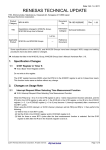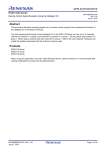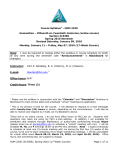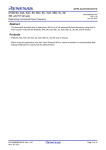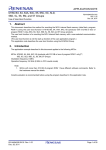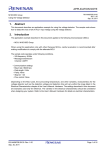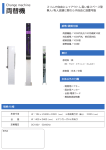Download Descriptions changed in M16C/5LD Group, M16C/56D Group User`s
Transcript
Date: Dec 14. 2011 RENESAS TECHNICAL UPDATE 1753, Shimonumabe, Nakahara-ku, Kawasaki-shi, Kanagawa 211-8668 Japan Renesas Electronics Corporation. Product Category Title MPU & MCU Document TN-16C-A210A/E No. Descriptions changed in M16C/5LD Group, M16C/56D Group User’s Manual Information Technical Notification Category Rev. 1.00 Lot No. Applicable M16C/5LD and M16C/56D Groups Product — Reference M16C/5LD Group, M16C/56D Group Document User’s Manual: Hardware Rev.1.20 Some specifications of the M16C/5LD and M16C/56D Groups have been changed. MCU usage and setting procedures have also been added or changed. Ä: Indicates the titles in the M16C/5LD Group, M16C/56D Group User’s Manual: Hardware Rev.1.20. 1. Specification Changes 1.1 Clock Ä 8.9.5 PLL Frequency Synthesizer To use the PLL frequency synthesizer, stabilize the supply voltage within the acceptable range of power supply ripple. The following table shows the acceptable range of power supply ripple and the figure shows the voltage fluctuation timing. Symbol f(ripple) VP-P(ripple) VCC(|ΔV /ΔT|) Parameter Min. Power supply ripple allowable frequency (VCC) Power supply ripple allowable (VCC = 5 V) amplitude voltage (VCC = 3 V) Power supply ripple rising/falling (VCC = 5 V) gradient (VCC = 3 V) f(ripple) Power supply ripple allowable frequency (VCC) Vp-p(ripple) Power supply ripple allowable amplitude voltage Standard Typ. Max. 10 0.5 0.3 0.3 0.3 Unit kHz V V V/ms V/ms f(ripple) VCC (c)2011.Renesas Electronics Corporation. All rights reserved. Vp-p(ripple) Page 1 of 6 RENESAS TECHNICAL UPDATE 1.2 TN-16C-A210A/E Date: Dec 14. 2011 G1BT Register in Timer S Ä 18.2.5 Base Timer Register (G1BT) Do not write to this register. The G1BT register becomes 0000h when the BTS bit in the G1BCR1 register is set to 0 (base timer reset). This function works same as before without any change. 2. Changes on Usage Note 2.1 Interrupt Request When Selecting Time Measurement Function Ä 18.5.6 Interrupt Request When Selecting Time Measurement Function When the FSCj bit (j = 0 to 7) in the G1FS register is set to 1 (time measurement function selected), and the IFEj bit in the G1FE register is also set to 1, the G1IRj bit in the G1IR register, or the IR bit in the ICOCiIC register (i = 0, 1) or ICOCHjIC register (j = 0 to 3) may become 1 (interrupt requested) after a maximum of two fBT1 cycles. When using the IC/OC interrupt i or IC/OC channel j interrupt, set bits FSCj and IFEj to 1, then perform the following. (1) Wait for two or more fBT1 cycles. (2) Set the IR bit in the ICOCiIC register and/or ICOCHjIC register to 0. (3) Wait for three or more fBT1 cycles after the time measurement function is selected. Set the G1IR register to 00h after the IR bit in the ICOCiIC register is set to 0. 3. Additions and Changes on Usage and Setting Procedures 3.1 Flash Memory 3.1.1 User Boot Mode Program Ä 26.11.4.1 User Boot Mode Program in Notes on Flash Memory Following notes have been added to the user boot mode description: • When using user boot mode, make sure to allocate the program to be executed to program ROM 2. • The LVDAS bit in the OFS1 address and bits WDTRCS1 and WDTRCS0 in the OFS2 address are disabled in boot mode. • When restarting the MCU in user boot mode after starting it in user boot mode, RAM becomes undefined. • If addresses 13FF8h to 13FFBh are all 00h, the MCU does not enter standard serial I/O mode. Therefore, the programmer or on-chip debugger cannot be connected. • As the reset sequence differs, the time necessary for starting the program is longer than in single-chip mode. • Functions in user boot mode cannot be debugged by the on-chip debugging emulator or full spec emulator. • While using user boot mode, do not change the input level of the pin used for user boot entry. However, if there is a possibility that the input level may change, perform the necessary processes in user boot mode, then restart the MCU in single-chip mode before the input level changes. • To use user boot mode after standard serial I/O mode, turn off the power when exiting standard serial I/O mode, and then turn on the power again (cold start). The MCU enters user boot mode under the right conditions. Page 2 of 6 RENESAS TECHNICAL UPDATE 3.1.2 TN-16C-A210A/E Date: Dec 14. 2011 Procedures When Suspend Function is Enabled Ä 26.8.1.1 Suspend Function (EW0 Mode), 26.8.2.1 Suspend Function (EW1 Mode) The procedure for enabling the suspend function has been modified. The modified figures and modifications are shown below. Post modification and premodification examples of the program flowcharts in EW0 mode are shown on the next page. Modified Figures • Program Flowchart in EW0 Mode (Suspend Function Enabled) • Block Erase Flowchart in EW0 Mode (Suspend Function Enabled) • Lock Bit Program Flowchart in EW0 Mode (Suspend Function Enabled) Modifications • The timing to set the I flag to 1 (interrupt enabled) has been changed. • The determination flag used in maskable interrupt routine has been changed from bits FMR32 or FMR33 to the FMR00 bit. Modified figures • Program Flowchart in EW1 Mode (Suspend Function Enabled) • Block Erase Flowchart in EW1 Mode (Suspend Function Enabled) • Lock Bit Program Flowchart in EW1 Mode (Suspend Function Enabled) Modification • The timing to set the I flag to 1 (interrupt enabled) has been changed. Page 3 of 6 RENESAS TECHNICAL UPDATE Date: Dec 14. 2011 TN-16C-A210A/E Post modification Maskable interrupt (1) Start I flag ← 0 Write 0 and then 1 to the FMR30 bit Interrupt disabled FMR00 = 0 ? Suspend enabled Yes FMR31 ← 1 (3) Write command code xx41h to WA address FMR00 = 1 ? Write WD0 to WA address No Suspend request No Access flash memory Yes Write WD1 to WA address I flag ← 1 FMR00 = 1 ? Program suspend accepted Interrupt enabled (2) No Yes Access flash memory FMR31 ← 0 Command restart REIT Full status check Program completed Notes: 1. In EW0 mode, set the interrupt vector table for interrupts to be used and the interrupt routine in areas other than flash memory. 2. When interrupts are not used, an instruction to enable interrupts is not necessary. 3. Program is not suspended until td(SR-SUS) elapses after the FMR31 bit is set to 1. Program Flowchart in EW0 Mode (Suspend Function Enabled) Premodification Maskable interrupt (1) Start Write 0 and then 1 to the FMR30 bit Suspend enabled Write command code xx41h to WA address I flag ← 1 FMR00 = 0 ? No Yes FMR31 ← 1 (3) Interrupt enabled (2) FMR33 = 1 ? Suspend request No Access flash memory Yes Program suspend accepted Write WD0 to WA address Access flash memory Write WD1 to WA address No FMR31 ← 0 Command restart FMR00 = 1 ? Yes REIT Full status check Program completed Notes: 1. In EW0 mode, set the interrupt vector table for interrupts to be used and the interrupt routine in areas other than flash memory. 2. When interrupts are not used, an instruction to enable interrupts are not necessary. 3. Program is not suspended until td(SR-SUS) elapses after the FMR31 bit is set to 1. Program Flowchart in EW0 Mode (Suspend Function Enabled) Page 4 of 6 RENESAS TECHNICAL UPDATE 4. Date: Dec 14. 2011 TN-16C-A210A/E Additions and Changes on Electrical Characteristics 4.1 Recommended Operating Condition for VCC Ä 27.1.2 Recommended Operating Conditions The characteristic of the minimum value for the VCC power supply has been modified. Standard Symbol VCC 4.2 Min. Characteristic Supply voltage Typ. Before After 3.0 2.7 Unit Max. 5.5 V Voltage Detector 2 Ä 27.1.5 Voltage Detector and Power Supply Circuit Electrical Characteristics The characteristics of Vdet2_0 to Vdet2_3, and Vdet2_5 to Vdet2_7 for voltage detector 2 have been added. Symbol Parameter Standard Condition Min. Typ. Unit Max. Vdet2_0 Voltage detection level Vdet2_0 3.21 V Vdet2_1 Voltage detection level Vdet2_1 3.36 V Vdet2_2 Voltage detection level Vdet2_2 3.51 V Vdet2_3 Voltage detection level Vdet2_3 3.66 V Vdet2_5 Voltage detection level Vdet2_5 3.96 V Vdet2_6 Voltage detection level Vdet2_6 4.10 V Vdet2_7 Voltage detection level Vdet2_7 4.25 V 4.3 When VCC is falling Power Supply Circuit Timing Characteristics Ä 27.1.5 Voltage Detector and Power Supply Circuit Electrical Characteristics The maximum value of td(W-S) has been modified. Standard Symbol Low power mode wait mode release time td(W-S) 4.4 Parameter Measuring Condition Min. Typ. Unit Max. Before After 150 300 VCC = 3.0 V to 5.5V μs Oscillator Ä 27.1.6 Oscillator Electrical Characteristics The characteristic of the dedicated 125 kHz on-chip oscillator for the watchdog timer has been added. Symbol fWDT Characteristic Dedicated 125 kHz on-chip oscillator for the watchdog timer oscillation frequency Standard Min. Typ. Max. 100 125 150 Unit kHz Page 5 of 6 RENESAS TECHNICAL UPDATE 4.5 Date: Dec 14. 2011 TN-16C-A210A/E Hysteresis VT+-VT- for TA0IN and others Ä 27.2.1 Electrical Characteristics (VCC = 5 V) The maximum value of the following VT+-VT- hysteresis has been changed. Standard Symbol VT+-VT- Parameter Hysteresis Unit Max. Measuring Condition Min. TA0IN to TA4IN, TB0IN to TB2IN, INT0 to INT5, NMI, ADTRG, CTS0 to CTS3, SCL2, SDA2, CLK0 to CLK4, TA0OUT to TA4OUT, KI0 to KI3, RXD0 to RXD4, ZP, IDU, IDW, IDV, SD, INPC1_0 to INPC1_7, CRX0 Typ. 0.2 Before After 2.5 0.4VCC V Ä 27.3.1 Electrical Characteristics (VCC = 3 V) The maximum value of the following VT+-VT- hysteresis has been changed. Standard Symbol VT+-VT- 4.6 Parameter Hysteresis Measuring Condition Unit Max. Min. Typ. TA0IN to TA4IN, TB0IN to TB2IN, INT0 to INT5, NMI, ADTRG, CTS0 to CTS3, SCL2, SDA2, CLK0 to CLK4, TA0OUT to TA4OUT, KI0 to KI3, RXD0 to RXD4, ZP, IDU, IDW, IDV, SD, INPC1_0 to INPC1_7, CRX0 Before After 1.8 0.4VCC V Two-Phase Pulse in Timer S Ä 27.2.2.5 Timer S Input, 27.3.2.5 Timer S Input The characteristics of two-phase pulse input in two-phase pulse signal processing mode have been added. Also the pin name TSUDA has been added to P8_0, and TSUDB to P8_1. Symbol Standard Min. Max. Parameter Unit tw(TSH) TSUDA, TSUDB input high pulse width 2 μs tw(TSL) TSUDA, TSUDB input low pulse width 2 μs tsu(TSUDA-TSUDB) TSUDB input setup time 1 μs tsu(TSUDB-TSUDA) TSUDA input setup time 1 μs Two-phase pulse input in two-phase pulse signal processing mode tw(TSH) tw(TSL) TSUDA input tsu(TSUDA-TSUDB) tsu(TSUDA-TSUDB) tw(TSH) tsu(TSUDB-TSUDA) tw(TSL) TSUDB input tsu(TSUDB-TSUDA) Note: 1. When the TSUDA and TSUDB phases are interchanged, tsu(TSUDA-TSUDB) and tsu(TSUDB-TSUDA) are also interchanged. Page 6 of 6






